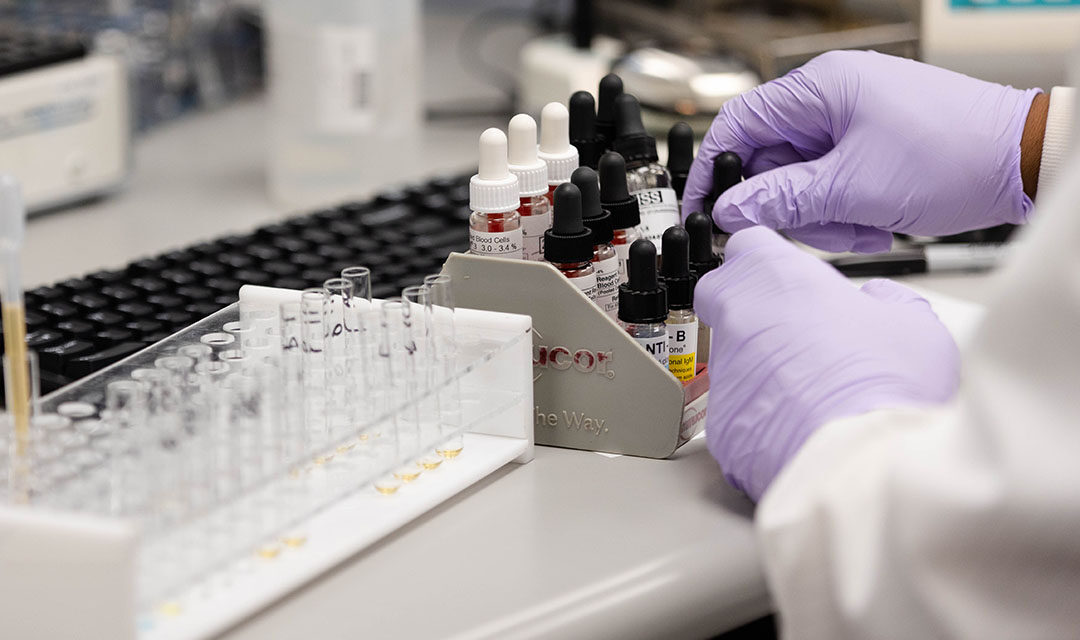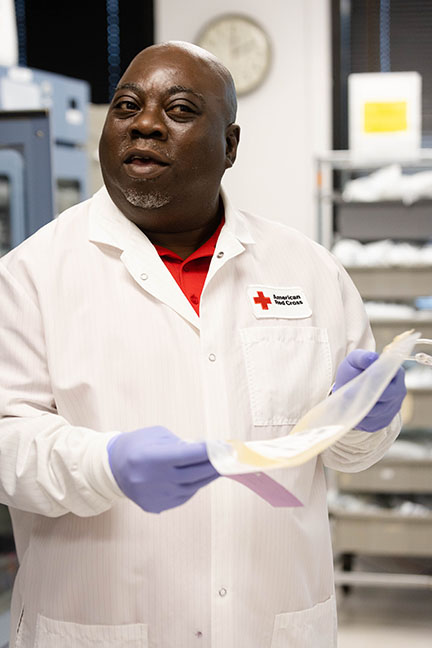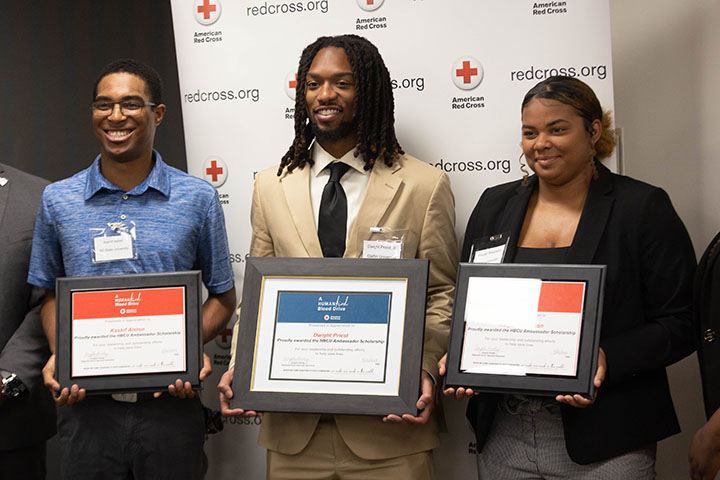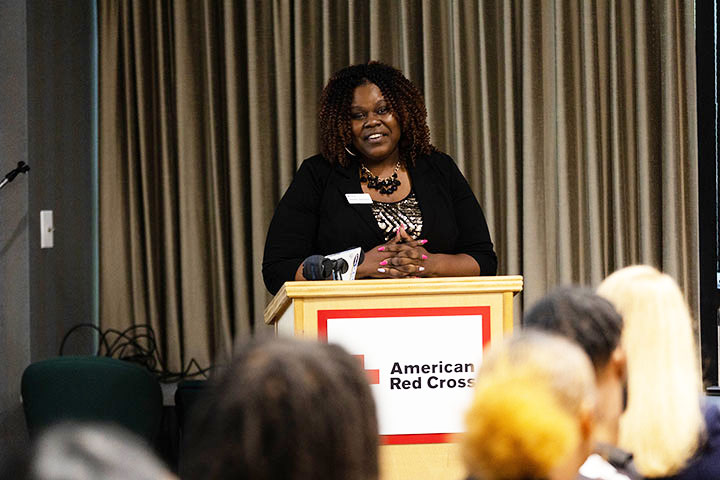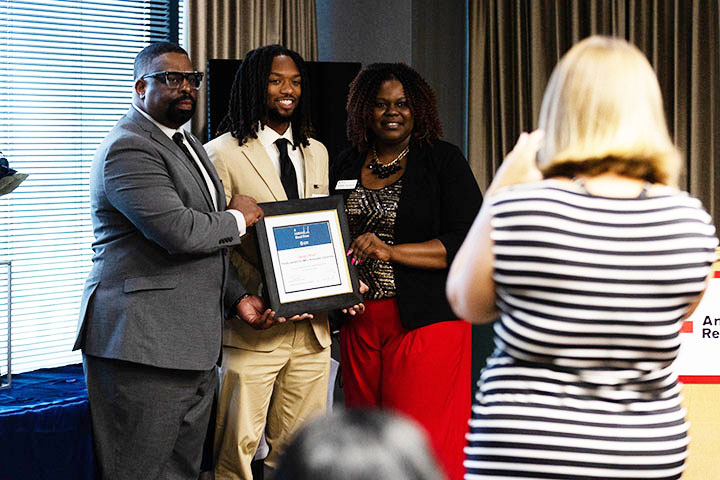An employee at the central office of the American Red Cross tests blood samples for antigens and antibodies. (Photos by Sydney Dunlap/Carolina News and Reporter)
The blood supply for the state of South Carolina sits in the back fridge of a lab in the basement of the American Red Cross’ central office.
Lining the fridge walls are shelves labeled with blood types.
Red Cross’ distribution manager encourages visitors to find the label of their own blood type along the wall. Then he has them note the many empty shelves below it.
The American Red Cross supplies 40% of the nation’s blood, and recent storms have left centers nationwide with a shortage.
The empty shelves would scare just about anyone. But some African-Americans have more reason than others to be concerned.
That’s why students at three South Carolina historically black universities are getting involved.
Allen University sophomore Kaiyah Robinson and South Carolina State University junior Kashif Alston will join Claflin University senior Dwight Priest Jr. in the American Red Cross’ HBCU Ambassador Leadership Program.
The students will organize blood drives at their universities along with ambassadors in HBCUs across the country. They’ll lead outreach efforts to inform students and the community about sickle cell disease — which primarily Black and Latino individuals — and the importance of donating blood.
Sickle cell disease causes blood cells to become rigid and sticky, causing pain as they move through the bloodstream, said Vesha Jamison, the sickle cell account manager at the Red Cross.
Jamison said many patients, including her son, rely on blood transfusions as a form of treatment for the disease.
Donated blood must contain unique antigens and be sickle cell-free to be used as a treatment, Jamison said. One in every three Black donors will be a match, compared to one in every 250 white individuals.
And 60% of the blood donors for the American Red Cross are white.
“There’s a lot of stigma, OK, around blood donations, and there’s a lot of historical hesitancy as well, just from things that have happened in African-American communities, a lot of stereotypes, a lot of misinformation,” Jamison said. “There’s a gap in that education and what it actually means.”
In South Carolina, more than 4,000 people have the disorder, according to the Medical University of South Carolina.
Jamison said she was unaware of what it meant to have sickle cell disease or be a carrier when she was younger and thinks it is beneficial that college students have the opportunity to be leaders in combating the disease.
“I believe that when we’re touching (students) a lot earlier, it creates or increases the chance of us having more education in our communities, as well as creating lifelong donors,” Jamison said.
Dwight Priest Jr., a part of last year’s inaugural class for the ambassador program , collected 96 units of blood during his blood drive. He tied for first place in donations against ambassadors at HBCUs across the country.
Priest said he is motivated by his competitive nature and inspired to continue supporting patients like Jamison’s son, who he said he sees as a little brother.
Jamison said the ambassadorship program has positively affected her son, Priest and the wider South Carolina community.
“I always say every unit has a face, and for them to make that connection. You know, it just meant so much,” Jamison said. “And for my son, it meant a lot to see someone who was out in the community working and boots on the ground for him.”
The Red Cross’ distribution manager, Mario Jenkins, also has sickle cell disease. He said he is proud to see more young people take on the cause.
“There wasn’t none of this on my yard (at my HBCU) when we started,” Jenkins said. “There wasn’t none of this in the Red Cross when I started here. So for them to have an initiative now to take care of something that is dear to me … I’m glad that you young men and women are picking up that, picking up that cause for us.”
This year, Priest hopes he can break another record.
“I wanna have an impact,” Priest said. “I think when I leave Claflin, whoever the next ambassador is behind me, they have real big shoes to fill.”
Mario Jenkins, the S.C. American Red Cross’ distribution manager, explains the organization’s process for handling blood and plasma after it is donated.
Kashif Alston, Dwight Priest Jr. and Kaiyah Robinson pose holding plaques honoring their participation in the Red Cross HBCU Ambassador Program.
Vesha Jamison, the sickle cell account manager at the American Red Cross, speaks to a small crowd at an event honoring the HBCU Ambassador Program.
Priest, a Claflin University senior, stands with Red Cross of South Carolina CEO Rod Tolbert and Jamison.

